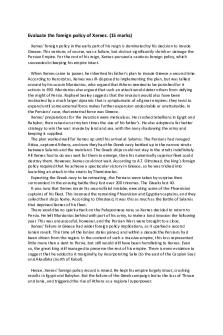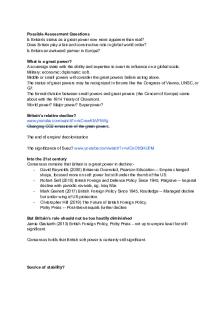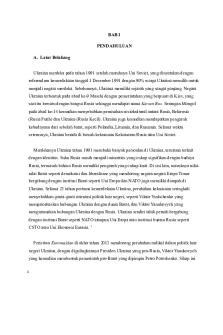Henry VII\'s Foreign Policy Essay PDF

| Title | Henry VII\'s Foreign Policy Essay |
|---|---|
| Author | Karam Clair |
| Course | Humanitarianism And Global Change |
| Institution | Middlesex University London |
| Pages | 2 |
| File Size | 90.6 KB |
| File Type | |
| Total Downloads | 73 |
| Total Views | 143 |
Summary
Henry's Foreign Policy essay question a-level...
Description
‘Henry VII successfully fulfilled his foreign policy aims’. How valid is this view? When Henry VII took the throne in 1485, one of his immediate concerns were to establish positive links with other nations in order to consolidate his reign and have his dynasty accepted, increase Crown revenues through methods such as trade and achieve all these policies as peacefully, avoiding war as much as he could. Henry may have had periods of successes and failures therefore, having a consistent foreign policy is more successful. As the success in 1487 may not constitute to foreign policy success in 1508.
As Henry was a usurper, consolidating his reign and dynasty was a major foreign policy as well as domestically. An effective way of completing this was with Marriage Alliances, of his children, as it would create good links with both countries as well. For example, Medina Del Campo, 1489, was the marriage alliance between Catherine of Aragon, King Ferdinand II’s daughter and Henry’s son, Prince Arthur. The alliance included factors such as the two monarchies offering mutual protection in the event of attack and not to harbour pretenders or rebels. This was more beneficial to Henry as it meant that he was recognised by the King of Spain, as the King of England and he also had a major power as an ally now. Another way he gained an alliance was after with Maximillian, the Holy Roman Emperor-elect, this was completed after he had to help defend Brittany from the invasion from France. As Henry was in debt to Brittany, as he grew up and was protected there for more than 14 years, he helped defend them from France and in turn held up to his word as well as keep an ally, further being recognised within Europe at the Treaty of Redon 1489. However, as Duchess Anne had reluctantly married Charles VIII, Maximillian lost interest with Henry VII. Even though, he had lost a potential ally, Henry was able to keep good relations with Brittany who were now linked with France, which may potentially reduce the threat from France attacking England. The bulk of England's exports went through the ports of the Netherlands which came under Burgundy's jurisdiction so, for commercial reasons, good relations needed to be maintained. Relations between England and Burgundy deteriorated in 1493 as a result of the hospitality which Maximilian and Philip were offering to Perkin Warbeck. Henry gambled that putting an embargo on English trade with Burgundy would ease the matter however this brought two of his foreign policy objectives into conflict (securing the dynasty and ensuring trade). Altogether helped to improve Henry’s image in Europe, and it was consistent throughout Henry’s whole reign as they were still alliances. Henry was seen as a ‘Miser King’ as he would always be tight with his money and is always looking for new ways to raise revenues, whether that’s through trade or exploration, but whatever way he did it, he completed it peacefully as it would cost him if went to war. Henry needed to keep his relations with Netherlands good, as the whole export industry in England depended on Netherlands due to a majority of Cloth going there as this industry grew by 60% during his reign from 1485 to 1509. Even though there were a few problems with Perkin Warbeck and Margaret of Burgundy, 1493, Henry essentially was able to achieve two of his aims in one Treaty knows as the Intercursus Magnus with Philip IV. Furthermore, this allowed the trade embargo to be ended thus trade could continue and Margaret recognised Henry’s position as King. This had further underlying meanings behind it, as it essentially meant, she would not help pretenders to overthrow Henry and he would start to feel more secure as King. However, this was only partially successful as another trade treaty was agreed which became known as the Intercursus Malus,1506, because it was over-generous to England, this was bad for England as their reliant industry for trade would not be able to
perform as usual. Saying this, although in reality less than a year later in 1507, a third treaty was agreed where everything reverted back to the terms of the first Intercursus Magnus, 1496. All of these were completely peacefully and in the most cost-saving and efficient manner, just like John Cabot when he arrived in Bristol in 1494 with aims to find new land and expedite new land to be found. Ironically, when new land was found it was called Newfoundland, which was a new fishing spot for fisherman who were looking for a new place after being excluded from the Hanseatic League. This suggests that England were eager to look and find new land to claim as their own, as exploring was an efficient way to make money due to new resources being found. But they were still lacking behind other European sailors like Spain and Portugal. Henry was careful with his Trading industry as it would anger people domestically and others if the wrong trade agreement was made, like the Intercursus Malus, however, there was no panic and everything was peaceful, and Henry continued to raise revenues through trade. Lastly, Henry wanted to maintain peace as if anything was to arise then it would be costly to Henry. He used marriage as a diplomatic device to bind Scotland into a closer union with England, the marriage of Margaret’s, Henry VII’s eldest daughter with James IV of Scotland under the terms of the Treaty of Ayton, 1502. The marriage helped to secure the succession in two ways, because the royal family had personal connections with the Tudor dynasty and Scotland would not provide home to pretenders, therefore, Henry’s threat had reduced. As well as Margaret of Burgundy usually helping Scotland, her threat was reduced even further, considering how wealthy she was, Henry was lucky to keep a neutral basis with her. The other marriage alliance had almost failed partially, as accordance with the Treaty of Medina del Campo, 1489, Catherine was to marry Arthur, however, Arthur died in 1502, and Catherine was made to marry Henry, Arthur’s brother, but she refused to. Instead of letting the princess go back to her father, Henry VII kept Catherine as it meant he would keep her dowry as well, otherwise it would have to go back with her. Whilst Henry kept both he also maintained peace with Spain, as Philip would not attack a country with her daughter in it, therefore Henry benefitted from a dowry and maintained an Ally. Another way he maintained peace was through accepting the Treaty of Etaples, 1492, where Charles agreed that he would no longer assist any pretenders and Henry would receive 50,000 Crowns a year. This equated to 5% of Henry’s income, this stayed consistent throughout till the end of his reign like all the other peaceful foreign policy ideas, as nothing changed, additionally, Henry received money the two things to make his foreign policy successful. The recurring themes that came up during Henry’s reign when it came to foreign policy was Margaret of Burgundy, money and peace, and they were all dealt with whilst becoming profitable, peaceful and posed little to no threat, all due to pragmatic policies that were consistent, hence showing that Henry’s foreign policy was extremely successful with only a few minor setbacks....
Similar Free PDFs

Xerxes\' foreign policy - answer
- 1 Pages

Foreign Policy notes
- 4 Pages

Synopsis Indian Foreign Policy
- 21 Pages

02. Qatar’s foreign policy
- 15 Pages

Foreign Policy in Latin America
- 11 Pages

Henry viii essay copy
- 3 Pages

Pakistan Foreign Policy 1947 to 2004
- 30 Pages
Popular Institutions
- Tinajero National High School - Annex
- Politeknik Caltex Riau
- Yokohama City University
- SGT University
- University of Al-Qadisiyah
- Divine Word College of Vigan
- Techniek College Rotterdam
- Universidade de Santiago
- Universiti Teknologi MARA Cawangan Johor Kampus Pasir Gudang
- Poltekkes Kemenkes Yogyakarta
- Baguio City National High School
- Colegio san marcos
- preparatoria uno
- Centro de Bachillerato Tecnológico Industrial y de Servicios No. 107
- Dalian Maritime University
- Quang Trung Secondary School
- Colegio Tecnológico en Informática
- Corporación Regional de Educación Superior
- Grupo CEDVA
- Dar Al Uloom University
- Centro de Estudios Preuniversitarios de la Universidad Nacional de Ingeniería
- 上智大学
- Aakash International School, Nuna Majara
- San Felipe Neri Catholic School
- Kang Chiao International School - New Taipei City
- Misamis Occidental National High School
- Institución Educativa Escuela Normal Juan Ladrilleros
- Kolehiyo ng Pantukan
- Batanes State College
- Instituto Continental
- Sekolah Menengah Kejuruan Kesehatan Kaltara (Tarakan)
- Colegio de La Inmaculada Concepcion - Cebu








